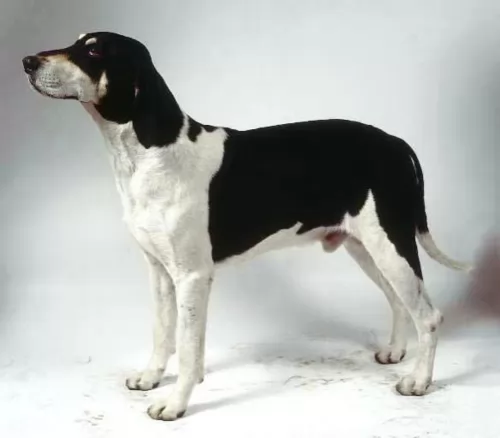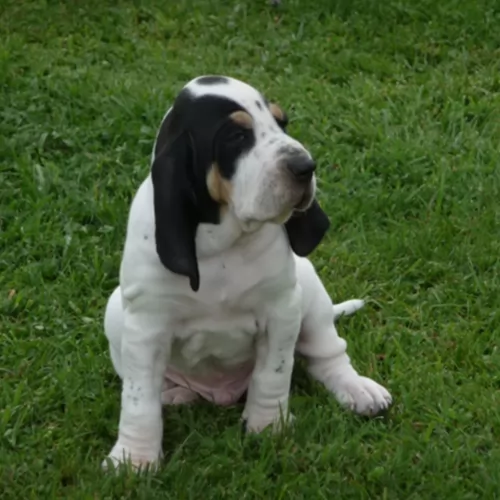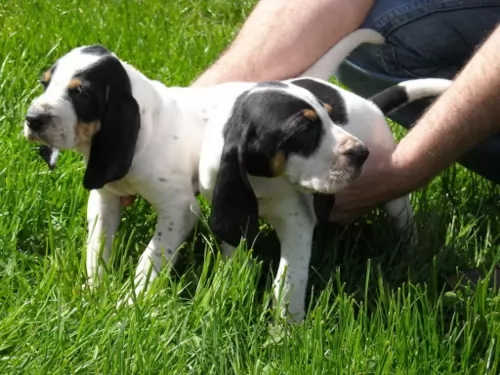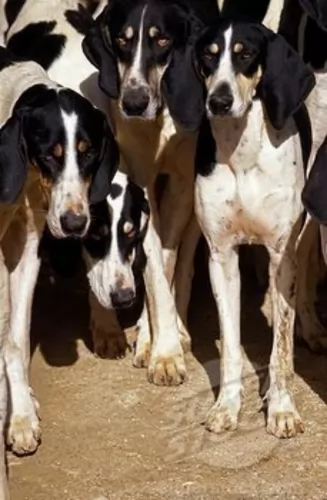 Petzlover
Petzlover Belgian Shepherd Dog (Laekenois) is originated from Belgium but Francais Blanc et Noir is originated from France. Belgian Shepherd Dog (Laekenois) may grow 6 cm / 2 inches shorter than Francais Blanc et Noir. Both Belgian Shepherd Dog (Laekenois) and Francais Blanc et Noir are having almost same weight. Both Belgian Shepherd Dog (Laekenois) and Francais Blanc et Noir has almost same life span. Belgian Shepherd Dog (Laekenois) may have more litter size than Francais Blanc et Noir. Belgian Shepherd Dog (Laekenois) requires Low Maintenance. But Francais Blanc et Noir requires Moderate Maintenance
Belgian Shepherd Dog (Laekenois) is originated from Belgium but Francais Blanc et Noir is originated from France. Belgian Shepherd Dog (Laekenois) may grow 6 cm / 2 inches shorter than Francais Blanc et Noir. Both Belgian Shepherd Dog (Laekenois) and Francais Blanc et Noir are having almost same weight. Both Belgian Shepherd Dog (Laekenois) and Francais Blanc et Noir has almost same life span. Belgian Shepherd Dog (Laekenois) may have more litter size than Francais Blanc et Noir. Belgian Shepherd Dog (Laekenois) requires Low Maintenance. But Francais Blanc et Noir requires Moderate Maintenance
 The Laekenois, from a variety of 4 Belgian Shepherds, and one of the rarest, is a working- or herding breed of dog which originated in Belgium. It is believed to have been around since the Middle Ages. The intelligent dog was also used for sending messages during the 1st World War. In most countries, all 4 of the dogs are considered the same breed with different varieties in coat types, but there are some instances where they are recognized as separate breeds.
The Laekenois, from a variety of 4 Belgian Shepherds, and one of the rarest, is a working- or herding breed of dog which originated in Belgium. It is believed to have been around since the Middle Ages. The intelligent dog was also used for sending messages during the 1st World War. In most countries, all 4 of the dogs are considered the same breed with different varieties in coat types, but there are some instances where they are recognized as separate breeds.
An interesting aspect of these dogs is that until the advent of dog shows in the 1900s, the 4 varieties were intermixed, and today purebred Laekenois can sometimes give birth to smooth-coated puppies which can be registered as Malinois.
 Translated from the French Chien Francais Blanc et Noir, is the French White and Black Hound. His ancestry goes back before the French Revolution to the old Hound of Saintonge and the Gascon Saintongeois. The Francais Blanc et Noir was bred to be a hunting dog and he is a scent hound. They were dogs that went hunting in packs, mostly for Roe and Red deer. In the late 19th Century, the Gascon Saintongeois was crossed with the Poitevin and the result was the Francais Blanc et Noir.
Translated from the French Chien Francais Blanc et Noir, is the French White and Black Hound. His ancestry goes back before the French Revolution to the old Hound of Saintonge and the Gascon Saintongeois. The Francais Blanc et Noir was bred to be a hunting dog and he is a scent hound. They were dogs that went hunting in packs, mostly for Roe and Red deer. In the late 19th Century, the Gascon Saintongeois was crossed with the Poitevin and the result was the Francais Blanc et Noir.
The breed was recognized in 1957 and by 2009 there were about 2000 dogs registered with the Federation Cynoloqique Interenationale. There are three types of the Francais line. They are the Chien Francais Tricolor and Chien Francais Blanc et Orange. The Blanc et Noir was bred as a hunting dog and they remain that especially in France. However, they are also very popular in dog shows. Because so many dogs belonged to hunters who felt no compulsion to register them, they were not recognized internationally for many decades later than they should have been.
Following the Second World War, breeding programs were in chaos and hunters were abandoning dogs that they could not feed. The military killed many dogs also. The Chien Francais Blanc et Noir saw its ranks greatly depleted but the breed survived. After being recognized in 1957 by the CKC and FCI, they gained international attention for the first time. Even though the breed is rare its numbers are greater than either of the other Chien Francais types. The breed registers 200 to 400 new dogs every year.
They are still endangered though because there are very few dogs left outside of France.
The UKC has recognized the breed but the AKC doesn’t.
 The Laekenois is a highly talented dog, highly energetic and extremely intelligent. He will make a superb family pet with owners who are firm and fair with him. The dog is bright, obedient, protective and somewhat territorial. He’ll guard what he believes is his as he is instinctively protective.
The Laekenois is a highly talented dog, highly energetic and extremely intelligent. He will make a superb family pet with owners who are firm and fair with him. The dog is bright, obedient, protective and somewhat territorial. He’ll guard what he believes is his as he is instinctively protective.
He will get on well with children in the home, and he can also be socialized to get on well with other pets in the home. Of course, the way an owner treats the dog, and any other dog for that matter, brings out different temperaments in a dog. To get the best from him he should be trained and socialized from an early age. He will need plenty of exercise if you don’t want him becoming destructive from sheer boredom.
The body is well proportioned, muscular and sturdy. He has an alert, intelligent face with erect ears, bright brown eyes and the nose black. The hair is dense on the long tail, but with no feathering like with the other breeds. The most common color is fawn with a reddish undertone. The chest is deep and the legs strong and straight. The Laekenois's medium length rough, wire coat can include colors from fawn to brownish and black in between.
 Being a pack hunting dog, the Francais Blanc et Noir is muscular and lean. A long legged athletic breed with long drop ears, a domed head, and flews overhanging the lower lip. The coat is black and white, with black and blue ticking. There are tan dot on the cheeks and above the eyes and also below the tail. These spots of pale tan color can also appear on the dog’s legs. The Francais Blanc et Noir is known for its scenting ability and for its great voice. With its athletic build it is also known for its ability to persevere
Being a pack hunting dog, the Francais Blanc et Noir is muscular and lean. A long legged athletic breed with long drop ears, a domed head, and flews overhanging the lower lip. The coat is black and white, with black and blue ticking. There are tan dot on the cheeks and above the eyes and also below the tail. These spots of pale tan color can also appear on the dog’s legs. The Francais Blanc et Noir is known for its scenting ability and for its great voice. With its athletic build it is also known for its ability to persevere
 The Belgian Laekenois is an energetic herding breed dog, and even though he will do well in an apartment if he is sufficiently exercised, big gardens and farms would be first choice for him. Wherever you offer him a home, make sure to exercise him regularly and give him plenty of attention, as he loves his human family.
The Belgian Laekenois is an energetic herding breed dog, and even though he will do well in an apartment if he is sufficiently exercised, big gardens and farms would be first choice for him. Wherever you offer him a home, make sure to exercise him regularly and give him plenty of attention, as he loves his human family.
He’ll make an exceptional watchdog and because he is so intelligent, he learns easily, responding readily to his owner’s instruction. He’ll protect his human family with his life. Social, lively, attractive and bright, anybody who has owned a Laekenois will vouch for his loyalty and devotion, making him a splendid pet.
 They are good with children as long as the children are not overly rambunctious.
They are good with children as long as the children are not overly rambunctious.
He is a large active dog that would not be adaptable to apartment or city life.
The breed is very smart and easily trainable.
 The lifespan of the Belgian Laekenois is between 10 and 14 years of age, and he is a pretty robust breed, not prone to getting sick easily. However, as with most other dog breeds, he is predisposed to some concerning health conditions.
The lifespan of the Belgian Laekenois is between 10 and 14 years of age, and he is a pretty robust breed, not prone to getting sick easily. However, as with most other dog breeds, he is predisposed to some concerning health conditions.
A frightening health issue in Belgian Shepherds is inherited epilepsy. It occurs in all four varieties. Your dog will have uncontrollable shaking that can last a few minutes. There are many causes of seizures but it is mostly an inherited disorder.
The most common eye disease is cataracts.
This is an inherited disease that causes the joints to develop improperly. He may even have difficulty getting up from lying down.
 The Francais Blanc et Noir has the propensity for several minor and a few major health problems. These include:
The Francais Blanc et Noir has the propensity for several minor and a few major health problems. These include:
Can lead to death if not treated immediately. Stomach twists and distends.
Can lead to arthritis and lameness if not treated.
These can be avoided if ears are checked and cleaned after each hunt and after exercise.
The breed is susceptible to the non-fatal type. Check for mites regularly.
Both seasonal and food potentially.
 The long, double coat of your Laekenois will need to be trimmed about twice a year otherwise he could look dirty and unkempt. Certainly with the coat he has, you will need to brush him at least twice a week to get rid of all those loose hairs.
The long, double coat of your Laekenois will need to be trimmed about twice a year otherwise he could look dirty and unkempt. Certainly with the coat he has, you will need to brush him at least twice a week to get rid of all those loose hairs.
He is a well muscled, athletic, energetic dog and his food, whether home-made or commercially manufactured, needs to be a high-quality food high in protein and packed full of minerals and vitamins. If you’re not sure about food type, speak to your vet, because as a dog expert, they will advise you on food appropriate to this dog breed and his energy needs. Whether you own a male or female Laekenois, feeding should be such that weight for an adult is maintained around 25–30kg.
 Until a year to 18 months feed two to three times per day two to two and one half cups of high quality dry dog food.
Until a year to 18 months feed two to three times per day two to two and one half cups of high quality dry dog food.
After 18 months of age feed the adult at least twice a day about three to four and one half cups of high quality dry dog food.
The Francais Blanc et Noir is a dog with a lot of energy and bred to be very active. He needs plenty of exercise and both mental and physical stimulation. If you jog take him with you or take him on long walks every day. He will need a large yard and he needs a job if he is not used for hunting. He is good at field trials, tracking exercises, a search and rescue dog and barn hunts.